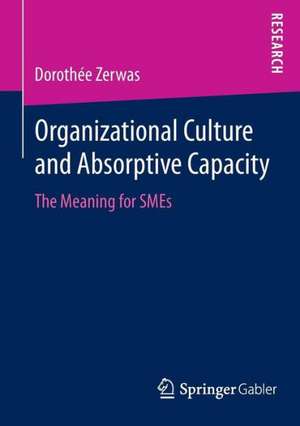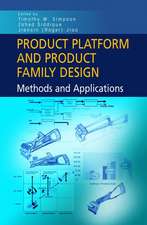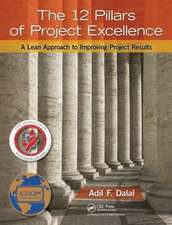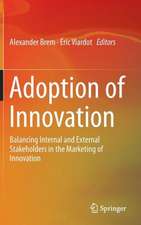Organizational Culture and Absorptive Capacity: The Meaning for SMEs
Autor Dorothée Zerwasen Limba Engleză Paperback – 16 apr 2014
Preț: 387.38 lei
Nou
Puncte Express: 581
Preț estimativ în valută:
74.13€ • 77.59$ • 61.70£
74.13€ • 77.59$ • 61.70£
Carte tipărită la comandă
Livrare economică 31 martie-14 aprilie
Preluare comenzi: 021 569.72.76
Specificații
ISBN-13: 9783658055516
ISBN-10: 3658055510
Pagini: 279
Ilustrații: XXIII, 279 p. 25 illus.
Dimensiuni: 148 x 210 x 17 mm
Greutate: 0.4 kg
Ediția:2014
Editura: Springer Fachmedien Wiesbaden
Colecția Springer Gabler
Locul publicării:Wiesbaden, Germany
ISBN-10: 3658055510
Pagini: 279
Ilustrații: XXIII, 279 p. 25 illus.
Dimensiuni: 148 x 210 x 17 mm
Greutate: 0.4 kg
Ediția:2014
Editura: Springer Fachmedien Wiesbaden
Colecția Springer Gabler
Locul publicării:Wiesbaden, Germany
Public țintă
ResearchCuprins
The Impact, Meaning and Challenges of External Knowledge Absorption.- The Conceptual Principles of Absorptive Capacity and Organizational Culture.- A Model of External Knowledge Absorption.- Implications for a Knowledge-Friendly Culture.
Notă biografică
Dorothée Zerwas is a post-doctoral researcher and lecturer at the University of Koblenz-Landau, Computer Science Faculty, Institute for Management.
Textul de pe ultima copertă
Firms are increasingly collaborating with outside partners to access external knowledge that will enable them to successfully innovate and remain competitive in the marketplace. To apply external knowledge, they must have a distinctive capacity to absorb knowledge. One of the main influencing factors for absorptive capacity is a knowledge-friendly organizational culture, because the knowledge absorbing behavior of individuals can be better coordinated through implicit values and norms than through structural coordination instruments. When focusing on an organization’s overall behavior, it is important to investigate in detail how a knowledge-friendly organizational culture influences absorptive capacity. Therefore, the author analysis the relationship between organizational culture and absorptive capacity and shows how a knowledge-friendly organizational culture should be designed to support the absorption of external knowledge in SMEs.
Contents
Dorothée Zerwas is a post-doctoral researcher and lecturer at the University of Koblenz-Landau, Computer Science Faculty, Institute for Management.
Contents
- The Impact, Meaning and Challenges of External Knowledge Absorption
- The Conceptual Principles of Absorptive Capacity and Organizational Culture
- A Model of External Knowledge Absorption
- Implications for a Knowledge-Friendly Culture
- Students and lecturers of innovation management
- Decision makers in knowledge management
Dorothée Zerwas is a post-doctoral researcher and lecturer at the University of Koblenz-Landau, Computer Science Faculty, Institute for Management.
Caracteristici
Publication in the field of economic science Includes supplementary material: sn.pub/extras













